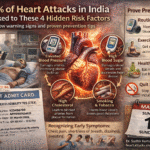Authored by Ms. Ritika Gupta, CEO of Aaera Consultants & Regional Director of Planet Education
After months of stress, sleepless nights, and countless revisions, boards are finally over. Students around the country have mixed emotions; there’s relief, excitement, and then there’s still the overlay of jitters. Now the big question looms: What’s next?
Even though this time seems very overwhelming, it is a great opportunity to pause and reflect for a while to make thoughtful and informed decisions about what lies ahead. Here are ways by which students can navigate life after board exams:
1. Take a Breather & Reflect
You have been given a chance to relax and rejuvenate before the next part of your life begins. Do things you enjoy: reading, traveling, or simply sitting with family and friends. A little time can gain clarity before taking very crucial decisions.

2. Career opportunities
There was a time when students could only pursue conventional careers such as engineering or medicine. But today’s world offers a range of thrilling career options, primarily in data science, digital marketing, artificial intelligence, sustainable development, gaming, and in areas like esports and content creation.
- Self-assessment- Learn your strengths, interests, and future aspirations.
- Career counseling: It would help if you had an expert’s intervention to be clear about steps and lead you into areas of a career you had not considered before.
- Internships & job shadowing: Real-time involvement, such as internships or even shadowing with professionals, will lead to informed career decisions
3. Post-Graduation: Choose the Right Path
For students pursuing further studies, choosing the right college, course, and country is important.
- Entrance Exams & Admissions: For students targeting competitive exams like JEE, NEET, CLAT, or SAT, the time has come to gather their wits. Understand the exam pattern, syllabus, and deadline regarding the application process.
- Alternative Modes of Education: Vocational training, online certifications, and short-term courses complement rather than supplement traditional degrees, enabling specialization in useful areas and opening diversified opportunities.
- Study Abroad: Researching universities and scholarship opportunities, and understanding application requirements, should be done while planning for an international education.
Read More :
https://thefirstcritic.com/post-study-work-visa-options-for-july-intake-students-in-australia/
4. Skill Development & Upskilling
The rapidly evolving job market does not restrict recruiters’ vision to evaluate only academic credentials. Now, it has become apparent that soft skills and technical capabilities are participative in the journey of one’s career.
- Digital skills: Knowledge of programming, data analytics, graphic design, and digital marketing comes as an added advantage.
- Communication & Leadership: If public speaking, negotiation, and teamwork are the soft skills for any career, communication is one.
- Financial Literacy: Awareness about the basic knowledge of savings, investment, and budgeting can become an asset in practical life.
5. Entrepreneurship & Unconventional Paths Consideration
For those with an entrepreneurial mindset, starting early can be an advantage.
- Start a business or small project for practical exposure.
- Try freelancing for content writing, coding, or designing.
- Use social media to promote your brand and network.
The board examination is just a single milestone along your road. One exam does not define your future, but rather a constellation of efforts and choices made over time. Be it higher studies, skill development, or entrepreneurship, let it be something that complements your passion and your strengths. This is your time to discover, learn, and grow.












More Stories
CTET February 2026 Re-Exams Set For Two Centres In Bihar
UP Board exams: principal solver held
Noida International University Successfully Organized Educators’ Meet in Durgapur